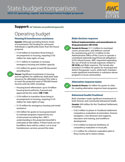The House operating, capital, and transportation budget proposals for 2023-25 were released on March 27 and heard in their respective committees. Like the Senate budget released last week, the $70 billion House budget funds city priorities such as housing,
State v. Blake implementation, and treatment programs. Infrastructure funding for broadband, culverts, and full funding for the Public Works Assistance Account are included.
Like the Governor’s budget, the House version assumes passage of a housing bond referendum for authority outside of the state debt limit to fund affordable housing. If passed by the Legislature and the voters, HB 1149 could raise
up to an additional $4 billion investment in housing. We appreciate the recognition for additional, dedicated state resources for affordable housing if the state is to meet the projected need of 500,000 low-income units by 2040. AWC has been
advocating strongly that additional resources in the form of the bond measure or HB 1628 creating a local option REET and increasing the state REET are critical—ideally, both would be enacted to approach the true scope of need
facing our state.
The House budget also relies on the Climate Commitment Act’s auction revenues from carbon emission allowances to fund new climate resilience and transportation projects for state and local governments.
The House budget has less robust criminal justice funding and focusses more on treatment program funding. It funds co-responder programs and increases therapeutic court funding; but it does not include continuation of the city criminal justice appropriation
for implementation of the new police reform laws passed in the last several years or the Senate’s proposal for vehicular pursuit technology grants, another signal that cities must continue to work with their House members to support work on
this issue this session.
The reserves are projected to be $3.2 billion for 2023-25.
 City impacts are highlighted below. For more details and information, see AWC’s budget matrix. AWC’s Budget Hot Sheet highlighting our preferred funding options in the House and Senate budgets, and the transportation budget article.
City impacts are highlighted below. For more details and information, see AWC’s budget matrix. AWC’s Budget Hot Sheet highlighting our preferred funding options in the House and Senate budgets, and the transportation budget article.
Operating budget
- Housing:
- $174 million for emergency housing and rental assistance.
- $150 million for covenant homeownership program (HB 1474, if passed)
- $150 million to transition those living in encampments to safer housing, requiring $120 million to be used for those living on state-rights-of-way.
- $130 million for the Housing and Essential Needs program.
- $52 million for homeless service contracts.
- $52 million for grants to support O&M costs of permanent supportive housing.
- $44 million for grants to local government to maintain programs impacted by loss of document recording fees.
- Housing bond referendum: up to $4 billion housing bond authority, if approved by the voters in a referendum (HB 1149).
- Resentencing implementation of State v. Blake: $11.5 million is provided to assist municipal courts, prosecutors, and defense counsel in resentencing impacted by the Blake decision and $51.4 million to the Administrative Office of
the Courts to operate a centralized statewide legal financial obligations (LFO) refund bureau. AWC has requested that the use of the $11.5 million be expanded to include expenses related to SB 5536 and Blake response.
- Implementation of amendments to drug possession related to State v. Blake (SB 5536): $41.6 million for substance abuse programs; $20.6 million for grants for therapeutic courts.
- Basic law enforcement training (BLEA): Funds 23 BLEA classes in both 2024 and 2025, with at least three classes in Spokane each year, and six additional training classes in three regional locations.
- Alternative co-response teams: $4 million for grants to cities to reimburse the cost of creating alternative response team programs.
- State shared revenues: Funds shared revenues at anticipated levels.
Capital budget
- $400 million to the Public Works Assistance Account, which honors the sunset of revenue diversions to education, but continues the $114 million diversion to the Move Ahead Washington transportation package passed last year.
- $150 million for broadband, including $75 million as a federal grant match for the Broadband Equity, Access, and Deployment (BEAD) state grants program and $37.5 million each to CERB and Public Works Board for local grants.
- Significant additional investments in affordable housing construction and other housing needs:
- $400 million to the Housing Trust Fund
- $83.2 million for the Inflation Reduction Act HOMES Program
- $75 million for Connecting Housing to Infrastructure (CHIP) grants to local governments
- $40 million for Housing Finance Commission Land Acquisition Program
Transportation budget
- $287 million for the Transportation Improvement Board:
- $3.9 million to Small City Pavement and Sidewalk Program
- $33.7 million for Complete Streets grants
- $9 million for city preservation and maintenance
- $70.9 million for Safe Routes to Schools grants
- $72.2 million for pedestrian and bicycle safety programs and grants
- $1 billion for state and local culverts
- $63 million for clean vehicle infrastructure
- $25 million for federal fund exchange pilot program
- $800,000 for WSDOT to coordinate with local governments and private entities to recommend new truck parking sites
- $250,000 from cities’ share of fuel tax revenues for JTC to convene a study of a statewide retail delivery fee
The last piece of the budget puzzle was the Senate Transportation budget released March 29. For an overview, see the transportation budget article.
Budget negotiations will begin in earnest after the April 4 fiscal cutoff as the Legislature works towards the end of session on April 23. Check the Legislative Bulletin next week for further updates and a comparison of programs in the Senate
and House budgets and take some time to share city budget priorities with your legislators.